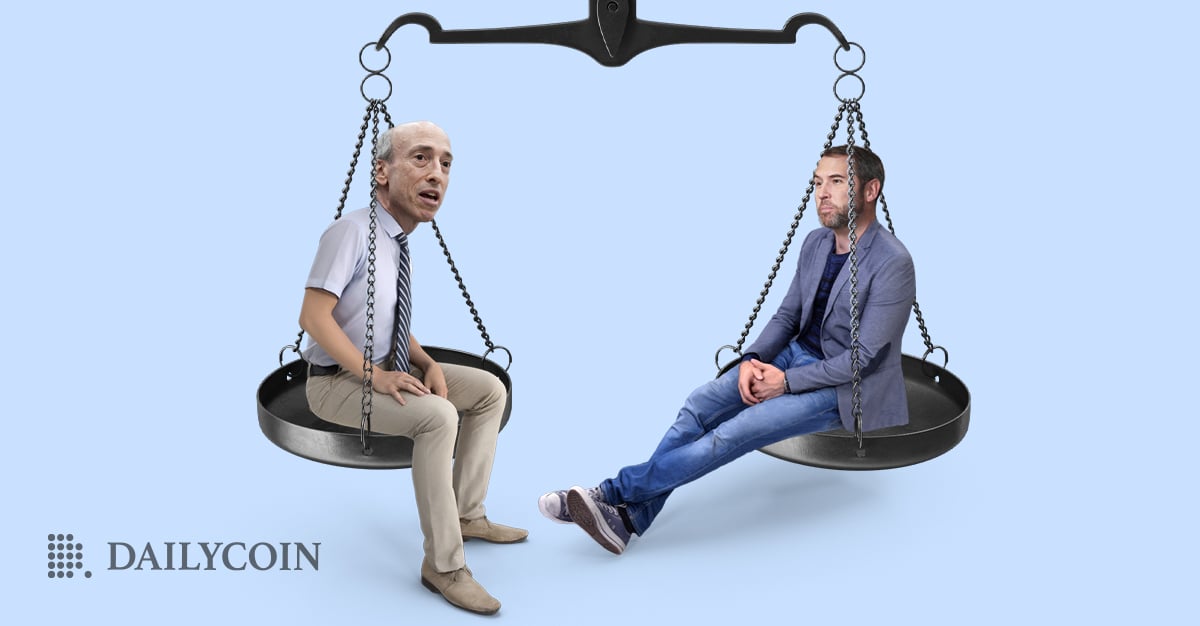
When the XRP token launched in 2012, no one expected this humble cryptocurrency to spark one of the most iconic legal battles in blockchain history – the SEC vs Ripple lawsuit. Long before Ethereum was even a twinkle in Vitalik’s eyes, Ripple was already one of the largest digital assets in the crypto market.
The SEC vs Ripple Case has gripped crypto news for years now. With time, crypto enthusiasts have become numb to the battle. The outcome of the SEC case will have consequences not only for XRP but for BTC, ETH, and the entire crypto community.
Why is the U.S. Securities and Exchange Commission going after Ripple Labs? How are things shaping up for XRP holders in the Supreme Court, and what can we expect to happen after the dust has settled?
Like Bitcoin, the Ripple blockchain is a decentralized digital payment protocol. Originally launched in 2012, Ripple aimed to be a fast and affordable way to transfer various fiat currencies across borders.
XRP is the native token of the Ripple network and is used to pay transaction fees. In its early days, Ripple was touted as an attractive option for banks and financial institutions looking to move funds internationally without being bogged down by complicated remittance issues.
Unpacking the SEC vs Ripple Lawsuit
Officially speaking, the XRP lawsuit refers to a case made by the SEC against Ripple Labs and two of its executives, CEO Brad Garlinghouse and his co-founder Chris Larsen. The District Court of New York oversees the case under Judge Analisa Torres.
But what are the charges that the SEC and their unshakeable chairman Gary Gensler are throwing at Ripple? Crypto tokens are sold and traded on secondary markets by thousands of people every day, so why does XRP have to bear the full force of the SEC’s jurisdiction?
The Charges Against Ripple (XRP)
The crypto industry’s biggest regulatory case started in 2020 when the SEC accused Ripple Labs of successfully raising over USD 1B through sales of XRP tokens. If you’ve been in crypto for longer than a week, you’re probably aware that Initial Coin Offerings (ICOs) like these are commonplace in the industry.
The big issue for the SEC is that, according to them, Ripple Labs and its executives conducted unregistered security offerings by selling XRP tokens to investors. The SEC considers that XRP is not a ‘currency’ but a ‘security’ and is subject to securities laws.
The SEC also claims that the Ripple CEO and co-founder were less than honest about the sale. They insist that Garlinghouse and Larsen made misleading and downright untrue statements about the XRP token and failed to officially register the sale, making the offering a violation of federal securities laws.
Finally, Gensler and Co claim that Ripple Labs knew that XRP should be treated as a security and chose not to inform their investors of this information. On the other hand, the Ripple camp argues that XRP is not a security but a currency and should not be held to securities laws.
Ultimately, it would appear that this raging legal battle boils down to a game of definitions. Two words might well decide the regulatory future of cryptocurrency. Should XRP be considered a currency or a security?
More to the point, what is a security anyway?
In 1946, the Supreme Court established a method for deciding whether or not an asset is defined as a security. According to the Howey Test, a security must meet the following requirements:
- An Investment of Money: The Howey Test requires that there must be an actual transfer of funds in exchange for an investment opportunity. Funds is a somewhat loose term which could refer to crypto and fiat currency.
- In a common enterprise: The investment contract is made in a joint enterprise. This implies that buyers collect their funds to profit from a shared enterprise.
- With an expectation of profits: The investor expects profits, meaning that they buy the security in the hope of earning a return on their investment.
- To be derived from the efforts of others: The final requirement implies that all profits are earned from the work and efforts of others.
In the simplest definition, if you make a financial investment in business and expect to profit from other people’s hard work, your asset is a security. The Howey Test is the framework used to define whether the XRP token is a security.
According to Ripple Labs, the XRP token is not a security. Ripple disputes the charges made against them because XRP is, in fact, a currency and cannot be subject to laws under the securities act.
Ripple insists that the entire court case is due to the SEC’s mischaracterization of the XRP token and that the ICO was not an unregistered securities offering. Adding salt to the wound, Ripple claims that the SEC is inconsistent in regulating cryptocurrency and suffocates an innovative and progressive industry.
Why the SEC Case Is Bigger Than Ripple Alone
The outcome of the SEC vs Ripple case will have far-reaching consequences on the cryptocurrency industry as a whole. Even if you’re not an XRP holder, the result of the XRP lawsuit is expected to change the way cryptocurrency is regulated in the United States. Blackswan events like the shocking bankruptcy of Sam Bankman Fried’s crypto exchange FTX have only added to the SEC’s case against crypto.
According to Fintech commentators like Bloomberg, the case will be wrapped within the first half of 2023.
What Happens if the SEC Wins?
Suppose the Supreme Court decides XRP is a security and the SEC wins the case. In that case, it will likely set a precedent for how other cryptocurrencies like Ethereum are regulated. The SEC has already begun cracking down on token staking, with top exchanges like Kraken being forced to cancel their staking services and pay $30M USD in fines.
Ripple Labs would likely need to face the music and pay significant fines. These penalties would be because of selling unregistered securities to investors in exchange for money.
If the SEC wins the lawsuit, it won’t be good news for XRP. The reputation of Ripple labs would suffer a severe blow, and the network may struggle to attract new users.
The SEC vs Ripple case is widely publicized, with regulators and policymakers worldwide waiting for a conclusive result. No matter where you live, the outcome of the Ripple lawsuit will impact how crypto is taxed and regulated in your own country.
What Happens if Ripple Wins?
If the Court decisions favor Ripple Labs, we could expect the XRP token and most other cryptocurrencies to be treated as currencies, not securities, in future regulations. Crypto would not be subject to federal securities laws in the U.S. Policymakers worldwide might follow this decision, providing more flexible terms for crypto regulations across the globe.
Ripple might receive a significant boost in popularity amongst crypto traders and investors. The dark cloud that has hung over the Ripple network since 2020 would finally blow over, and Ripple Labs would enjoy a renewed and reformed reputation in the crypto market.
The Effects of the SEC Lawsuit on XRP Growth
It cannot be denied that the SEC case against Ripple has been detrimental to the growth and adoption of the blockchain. The allegations have stifled XRP’s price, which struggled to match its competitors during previous market cycles due to the fear, uncertainty, and doubt the case caused.
Even top exchanges like Coinbase were not immune to the pressure of the Ripple case. The XRP token was delisted from the popular exchange in January 2023.
Regardless of the XRP lawsuit’s result, cryptocurrency regulation needs to be clarified so the industry can progress. All the lingering doubts around whether crypto is a security or currency only discourage the general public and institutional investors from entering the space.
The final verdict of the Ripple case will have widespread repercussions on how cryptocurrency is treated and regulated. While this officially only pertains to regulation in the United States, the case will likely affect how cryptocurrency is handled elsewhere as other governing bodies worldwide follow the SEC’s example.
Why Can’t You Buy XRP Anymore?
Due to the lawsuit laid against Ripple Labs and its founders by the U.S. Securities and Exchange Commission, XRP has been delisted on several crypto exchanges, such as Coinbase.
Why Does the SEC Think XRP Is a Security?
The SEC believes that the XRP token is a security because, in their view, it fits the definitions and requirements of a security provided by the Howey Test.
If Ripple loses the SEC case, more cryptocurrencies will likely be regulated by the SEC as securities moving forward. Ripple Labs would also be required to pay fines and penalties, and XRP’s price would likely suffer because of the network’s damaged public reputation.
What Happens If Ripple Loses to the SEC?
XRP is important because the result of the SEC vs Ripple case is expected to have ongoing effects on how cryptocurrency is regulated in the United States. Because many nations look to the United States as a leader in this field, how it regulates crypto may be followed elsewhere.
- SEO Powered Content & PR Distribution. Get Amplified Today.
- Platoblockchain. Web3 Metaverse Intelligence. Knowledge Amplified. Access Here.
- Source: https://dailycoin.com/sec-vs-ripple-will-lawsuit-decide-fate-crypto-industry/
- 10
- 11
- 2012
- 2020
- 2023
- 39
- a
- About
- According
- accused
- across
- Act
- added
- Adoption
- affect
- affordable
- After
- against
- All
- Allegations
- already
- amongst
- Analisa Torres
- and
- appear
- Argues
- around
- asset
- Assets
- attractive
- Bankruptcy
- Banks
- Battle
- battles
- Bear
- because
- become
- before
- being
- believes
- Big
- bigger
- Biggest
- Bitcoin
- blockchain
- Bloomberg
- blow
- bogged
- boost
- Brad Garlinghouse
- BTC
- business
- buy
- buyers
- Camp
- cannot
- case
- caused
- ceo
- chairman
- change
- charges
- chose
- Chris
- claim
- claims
- Cloud
- Co-founder
- Coin
- coinbase
- collect
- commentators
- commission
- Common
- community
- competitors
- complicated
- conducted
- Consequences
- considered
- considers
- contract
- could
- country
- Court
- crypto
- crypto community
- crypto exchange
- Crypto exchange FTX
- Crypto Exchanges
- Crypto Industry
- Crypto Market
- Crypto News
- Crypto regulations
- CRYPTO TOKENS
- crypto traders
- crypto would
- cryptocurrencies
- cryptocurrency
- Cryptocurrency Industry
- cryptocurrency regulation
- currencies
- Currency
- cycles
- Dark
- day
- Days
- decentralized
- Deciding
- decision
- decisions
- defined
- Derived
- digital
- Digital Assets
- Digital Payment
- disputes
- district
- district court
- doubt
- down
- during
- Dust
- Early
- earned
- Earning
- effects
- efforts
- elsewhere
- enjoy
- Enterprise
- enthusiasts
- Entire
- established
- ETH
- ethereum
- Even
- events
- Every
- every day
- example
- exchange
- Exchanges
- executives
- expect
- expectation
- expected
- expects
- external
- Face
- Failed
- far-reaching
- FAST
- favor
- fear
- Federal
- Fees
- Fiat
- fiat currencies
- Fiat currency
- field
- final
- Finally
- financial
- Financial institutions
- fines
- fintech
- First
- flexible
- follow
- followed
- following
- Force
- Forward
- founders
- Framework
- from
- FTX
- full
- funds
- future
- game
- Garlinghouse
- Gary
- Gary Gensler
- General
- general public
- Gensler
- globe
- going
- good
- Growth
- Half
- hand
- handled
- happen
- happens
- Hard
- hard work
- Held
- history
- holder
- holders
- hope
- How
- Howey
- Howey Test
- HTTPS
- ICO
- iconic
- ICOs
- Impact
- important
- in
- industry
- industry’s
- information
- initial
- initial coin offerings
- innovative
- Institutional
- institutional investors
- institutions
- internal
- internationally
- investment
- investor
- Investors
- issue
- issues
- IT
- January
- joint
- judge
- jurisdiction
- Kraken
- Labs
- largest
- launched
- Laws
- lawsuit
- leader
- Legal
- likely
- linked
- live
- Long
- longer
- Look
- looking
- Loses
- made
- make
- Making
- many
- Market
- Markets
- Match
- Matter
- meaning
- Meet
- method
- might
- money
- more
- most
- move
- moving
- Music
- Nations
- native
- Need
- needs
- network
- New
- New York
- news
- offering
- Offerings
- Officially
- ONE
- ongoing
- Opportunity
- Option
- originally
- Other
- Others
- Outcome
- own
- Pay
- payment
- People
- people’s
- plato
- Plato Data Intelligence
- PlatoData
- Point
- policymakers
- Popular
- popularity
- Precedent
- pressure
- previous
- price
- probably
- Profit
- profits
- Progress
- progressive
- protocol
- provided
- providing
- public
- raising
- receive
- refers
- register
- regulated
- Regulation
- regulations
- Regulators
- regulatory
- Remittance
- renewed
- repercussions
- reputation
- required
- requirement
- Requirements
- requires
- result
- return
- Ripple
- Ripple Ceo
- ripple labs
- ripple lawsuit
- Ripple network
- sale
- sales
- salt
- SEC
- SEC Case
- sec lawsuit
- SEC vs Ripple
- secondary
- Secondary Markets
- Securities
- Securities and Exchange Commission
- Securities Laws
- security
- Selling
- Services
- set
- Settled
- several
- severe
- shaping
- shared
- should
- significant
- since
- So
- sold
- somewhat
- Space
- Spark
- speaking
- Staking
- staking services
- started
- statements
- States
- Struggle
- subject
- Successfully
- such
- Supreme
- Supreme Court
- terms
- test
- The
- their
- things
- Think
- thousands
- Through
- Throwing
- time
- to
- token
- Tokens
- top
- touted
- traded
- Traders
- transaction
- Transaction Fees
- transfer
- u.s.
- U.S. Securities
- U.S. Securities and Exchange Commission
- Uncertainty
- under
- United
- United States
- unregistered
- unregistered securities
- USD
- users
- various
- Verdict
- View
- VIOLATION
- Waiting
- week
- What
- What is
- whether
- which
- while
- widely
- widespread
- will
- Wins
- within
- without
- words
- Work
- worldwide
- would
- Wrapped
- xrp
- xrp holders
- xrp lawsuit
- xrp token
- years
- Your
- zephyrnet












